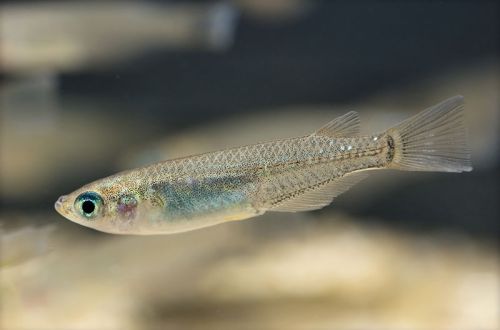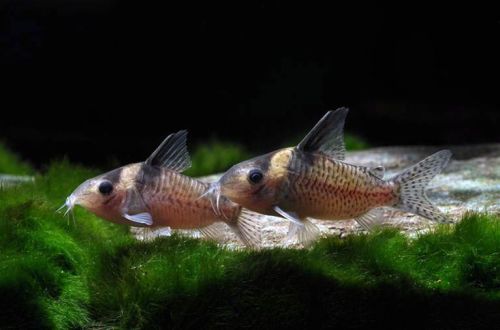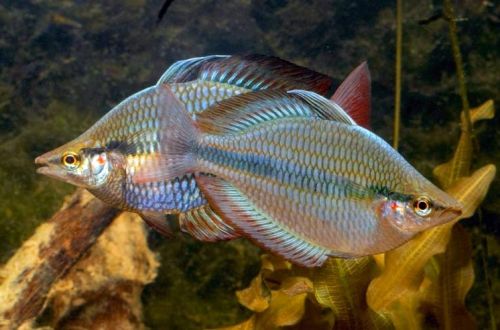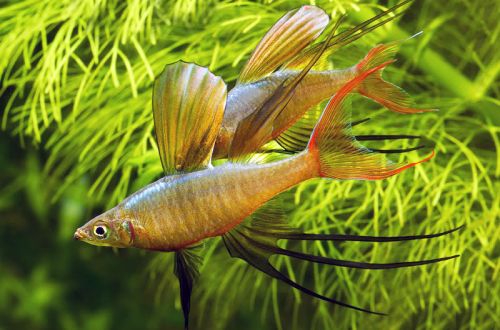
Japanese Orizia
The Japanese Orizia, scientific name Oryzias latipes, belongs to the Adrianichthyidae family. A small, slender fish that has been popular for decades in Southeast Asia, in particular in Japan, where it has been kept in artificial tanks since the 17th century. Refers to amphidromous species – these are fish that in nature spend part of their lives in both fresh and brackish water.

Thanks to its unpretentiousness and endurance, it became the first fish species to have been in space and completed a full cycle of reproduction: from spawning to fertilization and the appearance of fry. As an experiment, in 1994, Orizia fish were sent on board the Columbia roam for a 15-day flight and successfully returned to Earth with offspring.
Contents
Habitat
They are widely distributed in slow-flowing water bodies on the territory of modern Japan, Korea, China and Vietnam. Currently bred in Central Asia (Iran, Turkmenistan). They prefer wetlands or flooded rice fields. They can be found at sea, while traveling between islands in search of a new habitat.
Description
A miniature slender fish has an elongated body with a slightly arched back, reaching no more than 4 cm. Wild forms do not differ in bright color, soft cream color with iridescent blue-green spots prevails. They are rare in trade, mainly breeding strains are supplied, the most famous is Golden Orizia. There are also fluorescent ornamental varieties, genetically modified fish that emit a glow. They are derived by incorporating a fluorescent protein extracted from jellyfish into the genome.
Food
An omnivorous species, they gladly accept all types of dry and freeze-dried food, as well as finely chopped meat products. Feeding the Japanese Orizia is not a problem.
Maintenance and care
The maintenance of this fish is quite simple, not much different from the care of Goldfish, Guppies and similar unpretentious species. They prefer low temperatures, so the aquarium can do without a heater. A small flock will also do without a filter and aeration, provided that there are dense plantings of plants and regular (once a week) water changes of at least 30% are carried out. An important condition is the presence of a cover to avoid accidental jumping out, and a lighting system. Japanese Orizia can successfully live in both fresh and brackish water, the recommended concentration of sea salt is 2 level teaspoons per 10 liters of water.
The design should use a significant number of floating and rooting plants. The substrate is dark from fine gravel or sand, snags, grottoes and other shelters are welcome.
Social behavior
Calm schooling fish, although it is able to live in pairs. An excellent general aquarium candidate for any other small and peaceful species. You should not settle a large fish that will perceive them as prey, even if it is a vegetarian, you should not provoke it.
Sexual differences
Distinguishing is not always easy. Males tend to look more slender, dorsal and anal fins are larger than females.
Breeding / breeding
Fish are not prone to eating their offspring, so breeding is possible in a common aquarium, provided that representatives of other species do not live together. For them, fry will be a great snack. Spawning can occur at any time, the eggs continue to be attached to the female’s abdomen for some time, so that the male fertilizes. Then she begins to swim near the thickets of plants (requires thin-leaved species), attaching them to the leaves. Fry appear in 10–12 days, feed with ciliates, specialized microfeed.
Diseases
Resistant to most common diseases. Disease outbreaks occur primarily due to poor water and feed quality, as well as contact with sick fish. Read more about symptoms and treatments in the Aquarium Fish Diseases section.





